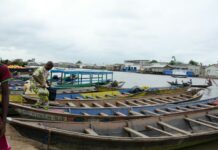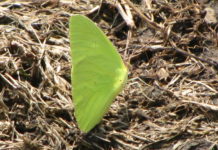Photo credit: DiasporaEngager (www.DiasporaEngager.com).
San Jose, Costa Rica, 6 May 2024 (IICA) – AGRA and the Inter-American Institute for Cooperation on Agriculture (IICA) jointly launched the biregional “Living Soils” initiative, which, based on its successful implementation in the Americas, will seek to restore degraded soils, rehabilitate acid soils, increase agricultural and landscape productivity and improve climate resilience in African agrifood systems.
Participating in the launch event were Mohamed Irfaan Ali, President of the Co-operative Republic of Guyana and current Chair of the Caribbean Community (CARICOM); Rattan Lal, recipient of the 2020 World Food Prize; Manuel Otero, Director General of IICA; as well as ministers of Agriculture of several African countries, AGRA authorities, private sector representatives, and other senior agricultural officials of the Americas and Africa.
Designed to improve rural well-being, productivity and food security while respecting environmental limits and making rational use of natural resources, Living Soils links science and public policies to rehabilitate and protect soils, whose degradation is threatening global food security.
Launched in 2020, Living Soils is spearheaded by IICA and Rattan Lal, the world’s leading authority on soil science and Director of the Carbon Management and Sequestration Center (C-MASC) at The Ohio State University.
At the launch event for the initiative in Africa, Lal, who is also an IICA Goodwill Ambassador for Sustainable Development Issues, called for driving and replicating what he described as “the miracle of the Brazilian Cerrado”, in reference to a unique biome that covers almost a quarter of Brazil’s land area and that is characterized by savanna vegetation and a wealth of flora and fauna.
To protect this territory, the South American country has enacted laws and established policies to regulate deforestation and foster sustainable agriculture practices related to the use and conservation of biodiversity.
“Africa possesses the natural resources required to create a miracle; Africa can become the next breadbasket of the world”, said Lal. “The strategy to achieve this should involve translating agronomic and soil management science into action, as well as developing policies that are pro-nature, pro-agriculture and pro-farmer, which is why this initiative is being launched in a timely manner”, he added.
In his presentation, the award-winning scientist added that, although African production systems are increasing their productivity, they are doing so at a slow pace. Therefore, he considered it necessary to take a big leap by fostering “knowledge and technology that is currently not being implemented, as well as improving the management of African soils, which are facing challenges such as degradation, primarily due to erosion, droughts, nutrient depletion, salinization, reduction of organic carbon in soils, urbanization and climate change”.
In the same vein, Mohamed Irfaan Ali, President of Guyana and CARICOM, stated that the Living Soils program “has tremendous significance for Africa because it addresses key environmental challenges and will allow for implementing regenerative agriculture practices, enhancing biodiversity and soil health, improving food security and contributing to climate resilience”.
“Africa possesses 30% of the world’s mineral reserves, 8% of its natural gas, 40% of its gold and 90% of its chromium and platinum. It has the largest reserves of cobalt, diamonds and uranium, and great mineral, agricultural and environmental potential. Africa is home to 65% of the world’s uncultivated land and 10% of the earth’s renewable water resources. It has tremendous potential to assume a leading role in the global supply chain and position itself as a key player in feeding the world”, mentioned Ali.
The President of Guyana also highlighted IICA’s strong leadership in the initiative, which had allowed for promoting sustainable agrifood systems that can transform the lives of small-scale farmers and rural dwellers. “In this developing world in which we are working to build a resilient, viable and competitive food ecosystem, IICA is carrying out commendable work, and I would like to acknowledge this leadership”, he said.
Watch the Launch https://www.youtube.com/watch?v=URpqJ2H78dc
Priorities of the initiative
In Africa, Living Soils will receive support from AGRA and will prioritize 11 countries in three agroecological regions: the Guinea savanna zone, which includes Ghana, Nigeria, Mali and Burkina Faso; highlands in the Eastern region, which include Ethiopia, Kenya, Uganda, Rwanda and Tanzania; and the Miombo woodlands, which include Malawi and Mozambique.
It will focus on leveraging South-South cooperation to foster climate-smart agriculture, restore degraded lands and increase productivity, thereby fostering resilience to the impacts of climate change by incorporating the requisite elements, such as inputs, bioinputs, technology, irrigation and climate-adapted crops.
To that end, the initiative will seek to replicate successful experiences and good practices implemented in the Americas, such as the 2020-2030 Brazilian Agricultural Plan for Climate Change Adaptation and Low Carbon Emissions (ABC Plan), as well as CARICOM’s vision to reduce the food import bill by 25% by 2025.
“Brazilian agriculture has played a fundamental role in fostering global food security through the implementation of innovative and sustainable technologies. Many of these technologies are the result of the establishment, 51 years ago, of EMBRAPA, which is the Brazilian agricultural technology company”, noted Roberto Perosa, Secretary of Trade and International Relations of the Brazilian Ministry of Agriculture, Livestock and Food Supply.
“We used to be an importing country and now we are a major exporter. Many African nations face challenges similar to ours with respect to agriculture and soil preservation, so we strongly believe in the importance of international cooperation to jointly address and support one another in overcoming these challenges. Initiatives such as Living Soils of Africa afford valuable opportunities to share experiences with sustainable agricultural technologies that can help our partner countries in Africa to restore degraded soils and adapt agriculture to the effects of climate change”, remarked Perosa.
During the event—which was moderated by U.S. journalist and Agri-Pulse Communications Editor-in-Chief Philip Brasher— Eyasu Elias, Minister of State for Agriculture of Ethiopia; Yaw Frimpong Addo, Deputy Minister for Crops of Ghana; and Aliyu Sabi Abdullahi, Senator and Minister of State for Agriculture and Food Security of Nigeria, shared the challenges they face and discussed opportunities to adapt key innovations and policy instruments that could lead to sustainable agrifood systems with healthy soils suitable for production. They also agreed to strengthen collaboration and the sharing of experiences between the Americas and Africa.
“The sharing of experiences, capacity building and collaboration are the main ingredients we need to give visibility to and make this initiative a reality in Africa. We are grappling with a very serious food crisis and one of the challenges we face are the poor soils our farmers are working with. Thus, having this program is a win in terms of food security, an issue of importance not only to Nigeria, but the whole world”, remarked Aliyu Sabi Abdullahi, highlighting the importance of South-South and triangular cooperation between nations.
“We face a number of challenges, but the most important one, which is also faced by other African countries, is soil erosion by water. This is due to topographic factors, but also to the high rate of deforestation, the loss of vegetation cover over the last few decades, the loss of nutrients and organic matter, the level of organic carbon in soils and their acidity”, explained Eyasu Elias, Minister of Agriculture of Ethiopia.
“In sub-Saharan Africa, we are suffering a great deal. The solution to the issue of soil health requires a multidisciplinary approach, synergies, the introduction of technologies, the mechanization of irrigation, and support to farmers with information and better credit opportunities. We want to help farmers become better prepared and trained to improve their soils”, stated Deputy Minister Yaw Frimpong Addo of Ghana.
The Director General of IICA, Manuel Otero, underscored the importance of the public and private sectors, research organizations, academia and civil society taking part in the initiative, in order to broaden its impact.
“Financial support is needed to help African and Latin American countries engage in this South-South cooperation. IICA is going to implement this initiative rapidly by allocating an initial USD 50,000 to support its first steps, but we must encourage other partners to join us and lend their support”, explained Otero.
Private sector support
Major food companies such as Bayer, Syngenta and PepsiCo are involved in the Living Soils of the Americas program. In that region, the program is currently underway in Brazil, Canada, Chile, Colombia, El Salvador, Mexico, Peru and Uruguay, with the support of the corresponding ministries of Agriculture.
“This initiative with Africa is very important. In the Americas, we have been able to promote international cooperation and collaboration with the private sector, farmers and civil society to drive the adoption of soil management and regenerative agriculture practices. As a result, agricultural productivity has improved and impacts on the environment have been mitigated”, said Mildred Nadah Pita, Head of Global Healthcare Programs/Sustainability in Middle Africa at Bayer.
“This initiative is crucial. AGRA and IICA are committed to revitalizing our soils, which are the foundation of our agricultural system. This is a flagship initiative for South-South cooperation that goes beyond just agriculture. It works to build resilient and improved systems, because healthy soils will allow for improving productivity, crop quality, income for farmers and countries’ economic performance. Our planet’s future is dependent on soil health”, concluded Jean Jacques Muhinda, Regional Manager for East Africa at AGRA.
Also participating in the launch event for the Living Soils of Africa initiative were Tilahun Amede, Head of Resilience, Climate and Soil Fertility at AGRA; Zelia Menete, Director General of the Mozambique Institute of Agricultural Research; Manyewu Mutamba, Head of Agriculture at the African Union Development Agency; and Jorge Werthein, Special Advisor to the Director General of IICA.
Source of original article: AGRA (agra.org).
The content of this article does not necessarily reflect the views or opinion of Global Diaspora News (www.GlobalDiasporaNews.com).
To submit your press release: (https://www.GlobalDiasporaNews.com/pr).
To advertise on Global Diaspora News: (www.GlobalDiasporaNews.com/ads).
Sign up to Global Diaspora News newsletter: (https://www.GlobalDiasporaNews.com/newsletter/) to start receiving updates and opportunities directly in your email inbox for free.

































